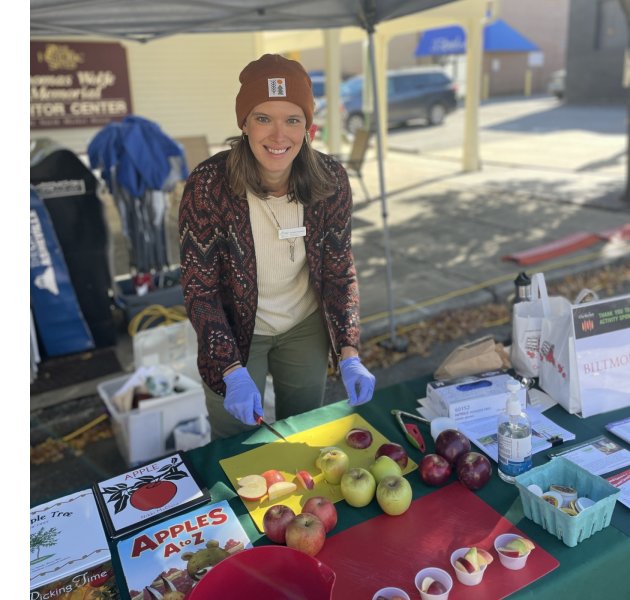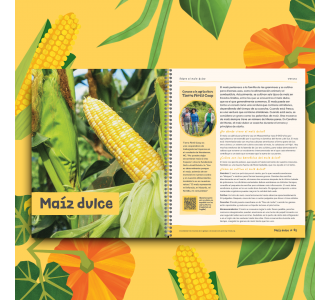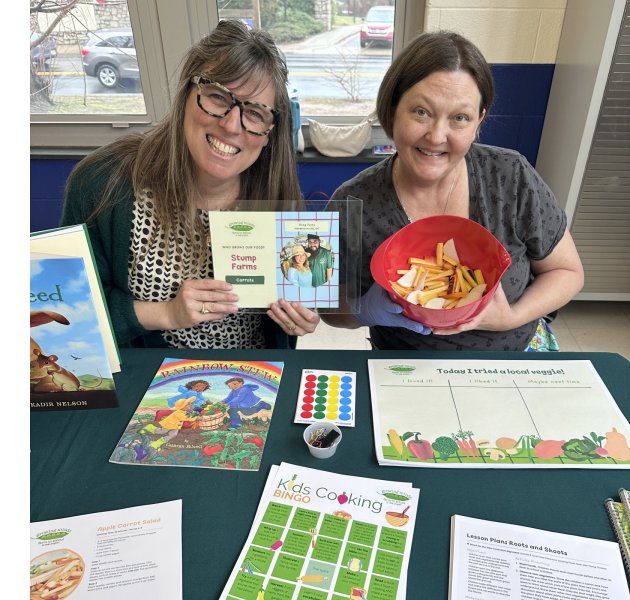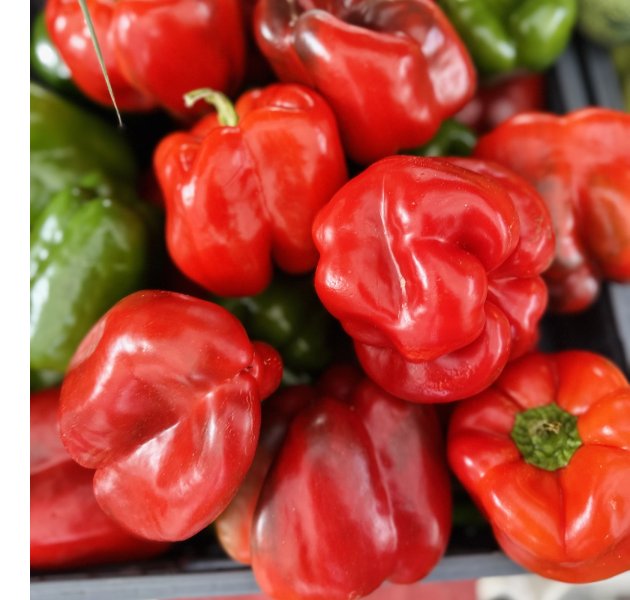|
|
|
monthly news from ASAP | SEPTEMBER 2024 | asapconnections.org
|
| |
|
|
ASAP's Farm Tour Is This Weekend, Sept. 21-22
|
ASAP's Farm Tour is coming up this Saturday and Sunday, from 12 to 5 p.m. both days! There's a lot of information about the tour to digest. Purchase a pass (passes are $35 until Friday at 11:59 p.m., then go up to $45). You can also find details about farms, a map, and driving directions. Need some more help in planning your tour? We have a few suggestions.
Tailor Your Tour
It can be overwhelming to pick which farms to visit! We curated a few themes to help you decide which farms best match your interests, whether you are looking for the best spots to entertain kids, to get tips for your own farm or garden, or enjoy some farm-fresh bites and beverages. The following themes—while not exhaustive—can help you narrow down which farms you’re most interested in visiting. We suggest using the themes in conjunction with geographic clusters in your planning!
Recorrido en español
Tips for the Tour
- Don't bring your dog! Dogs—or any pets—case pose a danger to livestock.
- Print directions or save your route offline. Cell service and GPS can be spotty on rural roads.
- Pack your gear. That includes rain and sun protection, closed-toed shoes, water bottle, cash, and cooler for any farm purchases.
- Print or screenshot your email or ticket. That's your pass! When you arrive at your first farm, check in with a volunteer at the Farm Tour table to get an admittance sticker.
- Take pictures! Tag @asapconnections and #asapfarmtour on social media, and submit your photos in our photo contest to win a pass to next year's tour! Find contest details here.
Check Out Our Sponsors
These businesses, publications, and organizations are supporting local food, farms, and our community. Find out more about some of their products or work in the links below!
B.B. Barnes | Gra-Mac Irrigation | Hendersonville Community Coop | Mast General Store | McDowell County Tourism Authority | Mountain Food Products | Painters Greenhouse | Pinecrest Bed & Breakfast | The Rural Seed Restaurant | Scratchmark Woodworking | Sow True Seed | Ward and Smith, P.A.
|
|
 |
Celebrate Farm to School Month in October
|
 This month we celebrate National Farm to School Month (and in North Carolina, Farm to School and Early Care and Education Month), which means celebrating all the local food and farm connections in the classroom. One way to join in is the North Carolina Crunch on Wednesday, Oct. 23. You don't have to be a student or educator to participate! Just crunch into a local fruit or veggie (an apple or anything else that makes a crunch!) at noon on Oct. 23 or another day during the month of October. Find resources for how schools, farmers, businesses, or other groups can get involved on the Growing Minds website.
Post pictures of your Crunch activity on social media with the hashtags #NCCrunch and #F2SMonth! Register your event to get additional resources (including an NC Crunch guide, logo, flyer template, sticker template, social media graphics, selfie photo frame, promo vidieo, and more) . No event is too small to register and you can skip the questions for schools if your event will not be held in a school.
|
|
 |
Nuevo recurso en español de Growing Minds
|
 El kit de herramientas "I Tried Local..." de Growing Minds ya está disponible en español e inglés. Cada unidad incluye una descripción general de los cultivos que crecen en Carolina del Norte, planes de lecciones, recetas, paginas para colorear, recomendaciones de libros, temas para debatir, y un enlace a la serie de videos “Conozca a su Granjero”, que presenta a los agricultores de Carolina del Norte. El vídeo de Tierra Fértil Coop está rodado en español con subtítulos en inglés. El kit de herramientas "I Tried Local..." de Growing Minds ya está disponible en español e inglés. Cada unidad incluye una descripción general de los cultivos que crecen en Carolina del Norte, planes de lecciones, recetas, paginas para colorear, recomendaciones de libros, temas para debatir, y un enlace a la serie de videos “Conozca a su Granjero”, que presenta a los agricultores de Carolina del Norte. El vídeo de Tierra Fértil Coop está rodado en español con subtítulos en inglés.
Las versiones en inglés y español están disponibles gratuitamente en formato digital aquí. Los ejemplares impresos sólo están disponibles en inglés. Para más información, póngase en contacto con [email protected].
—
The Growing Minds "I Tried Local..." toolkit is now available in Spanish as well as English! This resource gives educators tools to connect kids with how food is grown and the farmers in their communities who grow it. Each unit includes an overview of a North Carolina–grown crop, lesson plans, recipes, coloring pages, book recommendations, discussion prompts, and a link to the “Meet Your Farmer” video series featuring North Carolina farmers. The "Meet Your Farmer" video featuring Tierra Fértil Coop is filmed in Spanish with English subtitles.
Both the English and Spanish versions are available digitally for free here. Print copies are currently only available in English. Contact [email protected] for more information.
|
|
 |
Farm to School Virtual Workshop Oct. 16
|
 Interested in incorporating farm to school activities in your classroom, community group, or elsewhere? Join Growing Minds for an introduction to the principles and pillars of farm to school in a virtual workshop on Oct. 16 at 3:30 p.m. Interested in incorporating farm to school activities in your classroom, community group, or elsewhere? Join Growing Minds for an introduction to the principles and pillars of farm to school in a virtual workshop on Oct. 16 at 3:30 p.m.
In this training you will learn about the different components of farm to school, hear how you can use our "I Tried Local..." toolkit and resources to support your farm to school goals, and brainstorm activities you can use in your classroom. All are welcome no matter what your experience with farm to school is! Register for the free training here.
|
|
 |
 FACES OF LOCAL FACES OF LOCAL |
| |

Jason Treadway (pictured on the left) is the Director of Food and Nutrition for Verner Center for Early Learning. Verner has worked with Growing Minds to source from local farms and provide farm to school activities for the students. Jason’s staff of six serves breakfast, lunch, and snacks and two sites each day. Food is prepared at Verner East and taken over to the central site as well.
What are your favorite parts of your job?
Feeding children, working with my team, and the management group here at Verner. I love that I have a lot of freedom for sourcing local foods.
What has been your experience working with local farms?
We got a [ Growing Minds ECE procurement grant], so every Thursday I go and pick up a CSA from Seven Seeds Farm. They just moved to Marshall. They grow a lot of great produce. We just got some black raspberries that are really good. They send me an email a few days before the pickup and I build my menu around what they have available.
I also go to a farmers market a couple times a week to get supplemental items, like honey and more produce. Usually I go to River Arts District Farmers Market or Enka-Candler Farmer’s Market, which is near my house. It’s a really rewarding experience. The farmers all work so hard and are so happy to sell their food and be at the market. I feel lucky to be part of that and to be able to take those products off their hands and feed over 200 people.
I have a little farm, too, so I bring in basil or other herbs. Another staff member just brought in a bunch of pears. We have a small learning garden onsite where we also grow herbs. This is my first year gardening on this property, so I’m learning a lot about working with the balance of nature—like critters and bugs.
What are some things on your menus right now?
I did this really terrific roasted red pepper pesto. I’m mixing it into some whole wheat couscous this week. I used basil from garden, roasted local red peppers, sunflower seeds, parmesan, and olive oil. It’s a really nice red color. It taste like butter! We’re also doing some creamed corn, with corn from Lee’s One Fortune Farm. We’re serving peach salsa for snack with peaches from Lee’s One Fortune and local tomatoes. We’re using a lot of local apples, too. I do apple pie oatmeal with cinnamon that’s really good. I got some apple cider and am reducing a little bit with maple syrup for apple spice syrup for pancakes.
Do the kids have a favorite meal?
There’s a creamy pesto turkey pasta. I cook a whole turkey and use that. I don’t use any ground turkey. I’ll mix that with some orzo, fontina cheese, parmesan, pesto, and that’s pretty much it. Milk to make it saucy. They just go ga-ga over that. I like orzo, because it’s really easy for children to eat. It keeps its integrity and doesn’t get mushy.
What are some of methods or tricks you use to get kids to try new foods?
For example, broccoli. I stopped steaming broccoli. Instead I’ll do a light coat of olive oil, then in a hot oven for four minutes, and take it out when it’s just getting a little color. That keeps the integrity and flavor and adds a little crispness. Most vegetables I’ll do a light steam and shock in cold water, then season and bring up to temp. Basically we want to keep the heat moderate, so all the flavor doesn’t leak out. We recently got a dehydrator and are using it to supplement snack mixes with lots of dehydrated local fruit. Those are really rich in enzymes and last for many months.
Having my own son and introducing him to lot of foods, you can lose children in your own reaction. They feed off of that. For instance, if you are giving them cauliflower and you are unsure if they will like it, they’re looking at you. You need to give them space. Stare at a wall if you have to so you’re not letting them react to your reactions.
Why is it important for you to connect with farms and offer local food in early care centers?
It tastes better and the color is brighter. I’m dealing in bright colors. Having a relationship with these local food producers connects me with other people. There’s a network I can tap into that benefits our food programs. Someone called me recently about growing microgreens for us. Word gets around. And it supports the local economy and keeps farmers doing what they’re doing.
Find out more about farm to school funding from Growing Minds.
|
|
|
|
 RECIPE OF THE MONTH RECIPE OF THE MONTH |
| |  Inspired by Jason Treadway's menu at Verner Center for Early Education (see Faces of Local above), we're sharing a recipe for red pepper pesto. Jason suggests using this in pasta, as a pizza base, or just spreading it on toast. Inspired by Jason Treadway's menu at Verner Center for Early Education (see Faces of Local above), we're sharing a recipe for red pepper pesto. Jason suggests using this in pasta, as a pizza base, or just spreading it on toast.
Ingredients
- 3 large red bell peppers
- 1/2 cup olive oil, divided
- 3 large garlic cloves, peeled
- 1/4 cup sunflower seeds
- 3/4 cup fresh basil
- 1/4 cup freshly grated parmesan cheese
- 1/8 teaspoon red pepper flakes (optional)
- salt to taste
Directions
- Preheat the oven to 400 degrees. Place the peppers on a rimmed baking sheet and drizzle all sides with 2 tablespoons olive oil. Roast for 1 hour, flipping the peppers halfway through roasting. Remove from the oven and allow the peppers to cool for about 15 minutes. When cool enough to handle, remove the seeds, white membrane and stem.
- In the bowl of a food processor add garlic, sunflower seeds, and basil. Process until a coarse meal forms. Add the roasted peppers, parmesan cheese, red pepper flakes (if using) and salt. With the motor still running drizzle in 6 tablespoons olive oil. Season to taste with salt. If the pesto seems too thick, add water to thin as needed.
Find more recipes at growing-minds.org and asapconnections.org.
|
|
|
|
|
|
|
 MEDIA HIGHLIGHTS MEDIA HIGHLIGHTS |
| | "Asheville is a food lover’s paradise—but our delicious food scene wouldn’t exist without local farms. Get a behind-the-scenes look at how food is grown and cultivated during the annual Appalachian Sustainable Agriculture Project (ASAP) Farm Tour this Saturday + Sunday, Sept. 21-22, from 12 to 5 p.m."
"A lot of our work is trying to rebuild those positive connections to healthy food, to get away from very overabundant unhealthy food environments that have really degraded our health and have these hidden impacts on environment and community welfare."
|
|
|
|
| | |
ASAP's mission is to help local farms thrive, link farmers to markets and supporters, and build healthy communities through connections to local food.
|
|
|
|
|
|
|
|
|
|
|